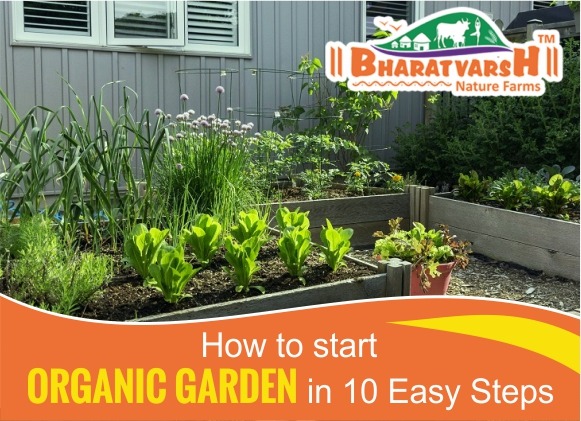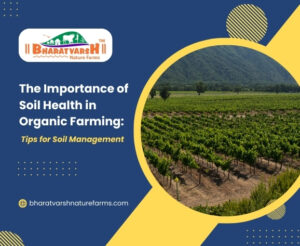10 EASY STEPS TO START AN ORGANIC GARDEN AT HOME?
With the growing public awareness for the pollution and pesticides in food items, many individuals desire to integrate organic foods into their regular meals. These organics are often substantially more expensive than their conventionally farmed equivalents. Good this is that you can start organic gardening at home at your home if you love gardening and have some space available. Along with your hobby, you will enjoy the garden-fresh air, and it will help you save money! We from Bharatvarsh nature farms are going to list here 10 easy steps to start your own organic garden at your home.
Starting an Organic Garden
Many veggies grow in India due to favorable climatic conditions. Beans, peas, sweet potatoes, and chilies are the common vegetable items that thrive in warm environments. However, we need to think through few very essential points in the beginning itself when we decide to set up an organic garden at home.
1. Set Your Garden Goals
Each of us have dream or vision for vegetable gardening at home, and this is where you should begin your gardening adventure.
- Spend some time drawing or writing about your ideal garden. Consider your garden objectives:
- Producing outstanding tomatoes to save money on groceries.
- Getting your kids outdoors to grow food.
- Establishing a pollinator habitat.
List your favorite foods to produce. Like when buying a car or house, start with “must-haves.”
2. Examine and Evaluate Your Property
Observation is vital before breaking ground and will assure future success. Spend some time monitoring the sun’s path on your land; search for sun and shade at various times as the season changes, remembering that many plants need at least six hours of direct sunlight daily. Consider going out after a significant rain to examine where the water travels since many vegetables may remain thirsty and few might suffer without proper drainage. Organic gardening benefits include a larger number of insects, flies and bees visiting your garden including those that seek to eat your gardens, so observe these harmful creatures especially caterpillars and insects.
During this process, you should also consider your time and availability. A realistic evaluation of your available time will direct you to the optimal size garden for you. A container garden is ideal for folks with limited time.
3. Soil Preparation
Healthy soil is essential for healthy plants. Your organic vegetables and herbs will need a lot of nutrients from the ground, and your garden soil may be depleted of nutrients due to chemical treatments. Other chemical fertilizers can potentially damage beneficial bacteria, micro organisms, and worms present in the soil. If you’re serious about having a successful organic garden, get a soil sample evaluated from your local agricultural office. If you let them know that you’re interested in organic gardening, they’ll be able to guide you about the needs of the garden soil. Any nutrients that are needed should be provided before winter.
4. Composting
Composting benefits all types of gardens, organic or otherwise. Compost recycles food leftovers,feeds plants, and also controls weeds. A good compost pile requires at least 3 square feet space, a lot of “brown stuff” (leaves, grass clippings, garden trimmings, etc.), and a lot of “green material” (kitchen scraps and manure).
5. Selecting Plants
The first step in organic growing at home is to plan what sorts of plants will be in your organic garden. The plants you may grow in your garden will be determined by the climate in which you reside. It’s important to research if the plants you desire will grow successfully. If you don’t choose the correct plants for your region, no matter how good your soil is, they won’t grow. Once you’ve concluded on your plants, you should plan out your garden and where each species will be placed to ensure that its sun, shade, and moisture requirements are satisfied.
6. Planting
After procuring your seedlings or plants, be sure to plant them in a method that is appropriate for each one. Raised beds are ideal for harvesting anything, such as flowers, herbs, or veggies. Plant vegetables in long rows to allow them to spread out. Plant your herbs in rows but in tight bunches to prevent weed development.
7. Watering the plants
You will, of course, need to water your plants regularly. The optimal time to water your plants, whether by hand or with an irrigation system, is in the morning. It’s not too hot, and there’s typically not much wind so the plants can take as much water as possible.
8. Weeding
Do you want to get some exercise? Get out in the garden and weed by hand, or use one of these natural weed-killing ways! Hand-weeding is the most acceptable approach to eradicate weeds since no chemicals or sprays are used.
9. Pest protection
Bugs are an unavoidable part of life. Some will be good for your plants, while others will not. Encourage predators such as frogs, lizards, birds, bats, and ladybugs to linger around in your garden if you need to safeguard your plants from small creatures.
10. Harvesting
Finally, your efforts have paid off, and you may enjoy the fruits of your labor. You’ll need to examine your garden every day throughout the peak season of your different plants. See the plant information for the ideal times to harvest your herbs and veggies.
If you have too many vegetables for you and your family, give some away or freeze and use them. Fill ice cube pans with olive or sunflower oil and add fresh herbs to the oil. Freeze the oil cubes to keep the spices fresh for an extended period.
Reach us at Bharatvarsh nature farms
If you need help in designing home garden layout, you can reach us for 10 easy organic garden design ideas for home. You’ll enjoy abundant fresh, organic vegetables all throughout the year at a fraction of the expense.
Also start planning the vegies for the forthcoming season at the peak of ongoing season so that you get sufficient time for procurement of plants. Happy gardening!
If you are interested in daily subscription and purchase of our dairy products,
you can always write to us for any enquiry @ info@bharatvarshnaturefarms.com
For more information and to place your order,
visit the website: www.bharatvarshnaturefarms.com
Call Us @ 8603214214 or 8650214214




